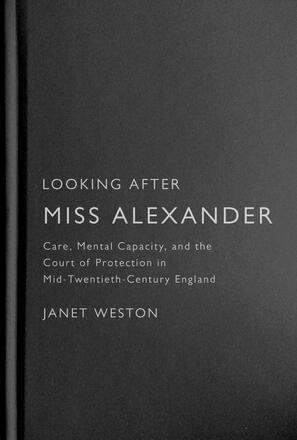
Looking After Miss Alexander
Care, Mental Capacity, and the Court of Protection in Mid-Twentieth-Century England
One woman’s encounter with the mental capacity law of England and Wales.
Description
In July 1939, at the Royal Courts of Justice in London, fifty-nine-year-old Beatrice Alexander was found incapable of managing her own property and affairs. Although Alexander and those living with her insisted that she was perfectly well, the official solicitor took control of her home and money, evicted her “friends,” and hired a live-in companion to watch over her. Alexander remained legally incapable for the next thirty years.
In the mid-twentieth century, Alexander was one of about thirty thousand people in England and Wales who were, at any time, legally “incapable” and under the auspices of what is now the Court of Protection. Focusing on the period between the 1920s and the 1960s, Looking After Miss Alexander explains the workings of the court, using Alexander’s unusual case to consider the complexities of this aspect of mental health law. Drawing on Court of Protection archives – some of which were made publicly available for the first time in 2019 – and micro-historical methods, Janet Weston also highlights the role of chance, subjectivity, and uncertainty in shaping how events unfolded then, and the stories we tell about those events today.
An engaging and accessible history of mental capacity law, Looking After Miss Alexander examines ideas of citizenship and welfare, gender and vulnerability, care and control, and the role of the state. It also offers reflections on historical research and writing itself.
Reviews
“This book is intellectually rigorous but also vivid and compelling, offering a fresh and original approach to the histories of the law, welfare, and mental health.” Kate Bradley, University of Kent and author of Lawyers for the Poor: Legal Advice, Voluntary Action and Citizenship in England, 1890–1990
“Weston built her book masterfully on the ‘small story’ of Miss Alexander, recognising the gaps in knowledge due to incomplete archival material. The gaps, as well as the story, create a base for discussion of themes such as personal autonomy, vulnerabilities, care and control, as well as challenges for historians, such as about dealing with ambiguities and filling gaps using imagination or speculation.” The Social History of Medicine